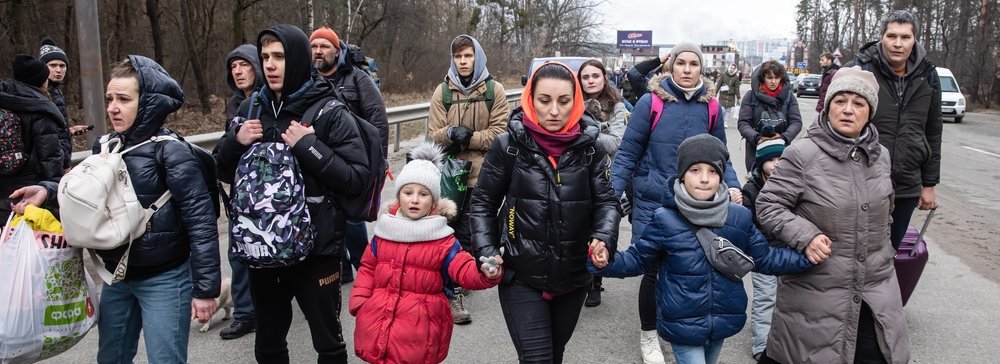| 7 mins read
Since Brexit, one of the most prominent political issues for the UK's Conservative administration has been ‘illegal migration’. The promise at the heart of the government's approach to Brexit—to ‘take back control’ of the borders—paved the way for significant reform of the immigration and asylum system, a key part of which has been the expansion of ‘safe and legal routes’—government-authorised pathways into the UK for certain people deemed in need of humanitarian protections. Such ‘safe and legal’ routes include bespoke, nationality-specific schemes for Afghans, Syrians, Ukrainians and Hong Kongers. These new humanitarian schemes mark a transactional and utilitarian approach to humanitarianism, where the UK claims for itself the right to choose who to protect, on what terms and at what cost to beneficiaries.
Who is allowed to come to the UK through the ‘safe and legal routes’?
The majority of those arriving in the UK through these channels have been from Hong Kong and Ukraine. These routes are domestically determined, not underpinned by the international protection framework, and offer unique insights into Conservative migration policy.
Indeed, the HK BN(O) visa was launched on 31 January 2021 following the UK government's judgement that the introduction of the national security law in the Hong Kong special administrative region breached the ‘one country, two systems’ approach agreed in the 1984 Sino-British Joint Declaration. From autumn 2023, the scheme was extended so that those with one BN(O) (British National Overseas) parent were able apply in their own right. Beyond this, applicants are required to demonstrate that they can support themselves in the UK for six months and pay the associated visa fees and the Immigration Health Surcharge (IHS). These fees set the HK BN(O) visa apart; the UK's refugee protections and other humanitarian routes are fee-free and waive the IHS. As such, the HK BN(O) visa sets a precedent in paying for protections.
Another large influx has been from Ukrainians fleeing the Russian invasion. The Ukraine schemes were modelled on the community sponsorship schemes already in place for Syrians and Afghans. There are no fees for those applying and a significant dimension of such schemes is that people arriving in the UK already have housing and accommodation organised. In addition, beneficiaries gain the immediate right to work, access to schools and healthcare, as well as certain welfare benefits. Such provisions are largely in line with what the UK offers to those with refugee status. However, unlike refugee status which offers a route to settlement, these visas were time-limited to three years.
Colonial legacies
The protections and rights offered to Hong Kongers and Ukrainians diverge from those offered through the UK's asylum regime. All those whose asylum claims are successful and are granted refugee status have a route to settlement as standard after five years, and also have access to public services, healthcare, work and welfare benefits. The contrast is marked for the Hong Kongers who are required to pay for the protections they receive and their access to healthcare. For the Ukrainians, while rights and provisions are similar to those offered to refugees, the impermanence of their status distinguishes these provisions from others receiving humanitarian protections—including Syrians and Afghans eligible for resettlement in the UK via bespoke schemes. This extends a longer trajectory of sorting and ordering through the UK's immigration controls with links to colonial practices of racial distinction.
Indeed, the genealogy of the HK BN(O) visa demonstrates how the UK government eroded the rights of Hong Kongers from the introduction of the Commonwealth Immigration Act 1962 onwards, notably classifying Hong Kongers as nationals rather than citizens through the British Nationality Act 1981. This status was repurposed as the basis for the HK BN(O) visa scheme and reconstituted these former citizens as ‘good’ migrants at a time when the UK is repositioning itself internationally and highlights colonial influences within this post-Brexit migration strategy.
Sponsorship, privatisation and precarity
The ephemerality of the Ukraine visas also sets them apart from other sponsorship schemes offered through the UK's ‘safe and legal routes’. The distinction was reaffirmed in February 2024 when the UK announced that beneficiaries were able to apply for an eighteen-month extension, but with no offer of a route to settlement. The absence of a pathway to long-term settlement in the humanitarian visa schemes leaves people with no control over whether they are allowed to build their lives in the UK or not.
These schemes also expand the role of private sponsors in the provision of humanitarian protections. The state becomes responsible only for the management of resettlement, because responsibility is transferred to sponsors. What these schemes demonstrate is the increasing privatisation of humanitarian protections with the responsibilities for protection transferred to private actors. The Ukraine visa schemes increasingly rest on diffusing responsibility for humanitarian protections and support to the population at large. In the context of the UK, this echoes the policy approach at the heart of Theresa May’s ‘hostile environment’, where immigration controls become increasingly deputised and outsourced to the public—effectively shifting humanitarian responsibilities away from government.
Conclusion
The launch of bespoke schemes for Hong Kongers and Ukrainians has marked a change of pace in the UK's commitment to offering humanitarian protections via designated ‘safe and legal routes’, allowing almost 400,000 people to arrive in the UK through these schemes in three years. The schemes are evidence of a concerted effort by the UK government to exercise greater control over the humanitarian protection regime. This runs counter to the universalist approach underpinning the international protection framework built around the 1951 Refugee Convention on which the UK asylum system was based. In other words, this is a move away from the multilateral international system that emerged in the wake of World War Two, towards a more transactional and utilitarian approach to international relations whereby the UK claims for itself the right to choose who to protect and on which terms.
Need help using Wiley? Click here for help using Wiley









